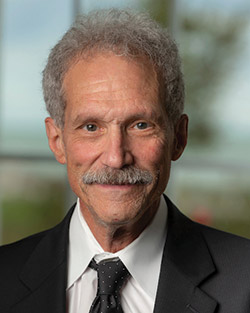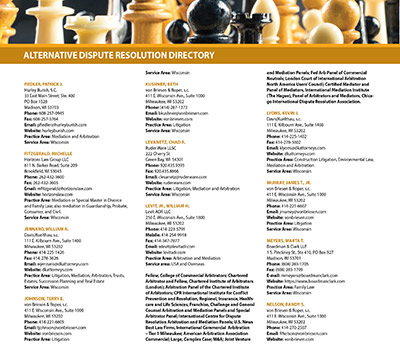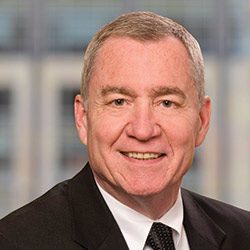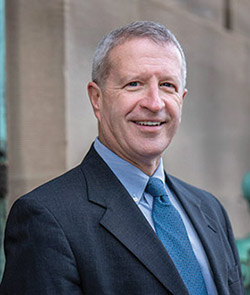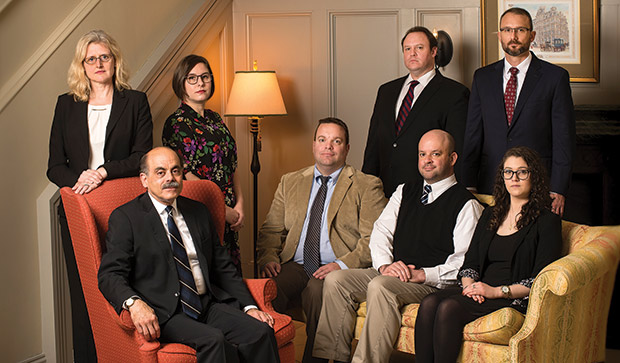Personal injury mediator sees less cases settling
By: Jane Pribek//December 17, 2012//


A few years ago, opposing counsel in closing arguments called J. Michael Riley a “gun for hire,” likening the Axley Brynelson LLP lawyer to the character of Paladin in “Have Gun — Will Travel.”
“I got up and said, ‘I’m flattered that you think that,’” Riley said, “‘because Paladin was the guy who righted wrongs. That’s exactly what I think lawyers should do.’”
It’s a sentiment he’s held onto for decades. Riley, a third-generation Madison lawyer, will soon celebrate 40 years practicing law.
He’s been a mediator for about half that time. He’s settled countless cases as a neutral, while building a successful plaintiff’s personal injury practice.
Riley also has helped make case law that benefits others, as well as his clients. He prevailed before the Wisconsin Supreme Court in Atkins v. Swim West, a 2005 opinion striking an overly broad exculpatory clause in a registration form.
Then, in 2009, in Umansky v. Fox, et al., the court agreed with him that the director of facilities at Camp Randall, a state employee, had a ministerial duty to ensure that a railing was in place around a platform pursuant to an OSHA regulation.
Wisconsin Law Journal: What’s your style of mediation?
J. Michael Riley: I’m a personal injury mediator. I have a lot of expertise in that area, so obviously, I rely on my skills as an evaluator in the process. That’s particularly helpful, I think, for injured people. Insurance companies have their own evaluators, which they aren’t likely to stray too far from. But individuals — the majority of which have been in auto accidents and are suffering from soft-tissue injuries — don’t always understand the costs and risks of going to trial. I also think good mediators establish a rapport with both sides. They establish confidence in both sides that they’ll help both sides reach a fair resolution. That’s facilitative, too.
WLJ: What changes have you seen in mediation lately?
Riley: Over about the past five years or so, it’s become more difficult to settle cases. Something like 90 percent still settle — but it’s still a few less. I think it’s because insurance companies are increasingly driven by computer analyses, and hard and fast numbers they won’t budge from. It’s not that lawyers’ attitudes have changed, but companies’ attitudes have.
Also, in the past few years, I’ve tried to encourage more early mediation, sometimes pre-suit. I’ve seen a lot more adverse medical examinations in cases in recent years, both as a lawyer and mediator. I try to convince parties to mediate before them, whenever possible, because they generally don’t help the mediation. It saves the insurance company money, and it saves the injured party from having to go through the process.
WLJ: What’s the No. 1 mistake attorneys make in preparing either themselves or their clients for mediation?
Riley: Too many plaintiffs’ lawyers haven’t adequately prepared their clients for the reality of what their cases are worth. Maybe the lawyer isn’t terribly experienced, made a mistake in the evaluation or just isn’t willing to have that talk with their client. They haven’t adequately discussed with them the costs and risks of going to trial. I always run that calculation with my clients before a mediation. And when I’m mediating, I often run it for other people’s clients.
On the insurance company side, I’ve noticed that sometimes they don’t want to listen to their lawyers anymore. In a lot of cases, it’s just impossible for their lawyers to get any additional authority.
WLJ: What’s your definition of success?
Riley: One of my very good friends was (attorney) Steve Caulum — just a wonderful guy. He died of cancer a few years ago, unfortunately. Before he left us, I was golfing with him, and I told him, “I just don’t know a better lawyer or a better person than you.” It was absolutely true, and if people say that about me some day, I’d be absolutely delighted. Oh, by the way, Steve was a defense lawyer.
Legal News
- Wisconsin attorney loses law license, ordered to pay $16K fine
- Former Wisconsin police officer charged with 5 bestiality felony counts
- Judge reject’s Trump’s bid for a new trial in $83.3 million E. Jean Carroll defamation case
- Dozens of deaths reveal risks of injecting sedatives into people restrained by police
- The Latest: Supreme Court arguments conclude in Trump immunity case
- Net neutrality restored as FCC votes to regulate internet providers
- Wisconsin Attorney General asks Congress to expand reproductive health services
- Attorney General Kaul releases update at three-year anniversary of clergy and faith leader abuse initiative
- State Bar leaders remain deeply divided over special purpose trust
- Former Wisconsin college chancellor fired over porn career is fighting to keep his faculty post
- Pecker says he pledged to be Trump campaign’s ‘eyes and ears’ during 2016 race
- A conservative quest to limit diversity programs gains momentum in states
WLJ People
- Power 30 Personal Injury Attorneys – Russell Nicolet
- Power 30 Personal Injury Attorneys – Benjamin Nicolet
- Power 30 Personal Injury Attorneys – Dustin T. Woehl
- Power 30 Personal Injury Attorneys – Katherine Metzger
- Power 30 Personal Injury Attorneys – Joseph Ryan
- Power 30 Personal Injury Attorneys – James M. Ryan
- Power 30 Personal Injury Attorneys – Dana Wachs
- Power 30 Personal Injury Attorneys – Mark L. Thomsen
- Power 30 Personal Injury Attorneys – Matthew Lein
- Power 30 Personal Injury Attorneys – Jeffrey A. Pitman
- Power 30 Personal Injury Attorneys – William Pemberton
- Power 30 Personal Injury Attorneys – Howard S. Sicula





